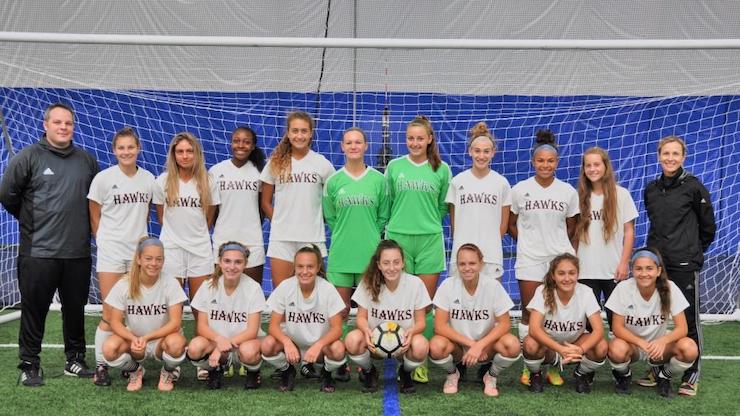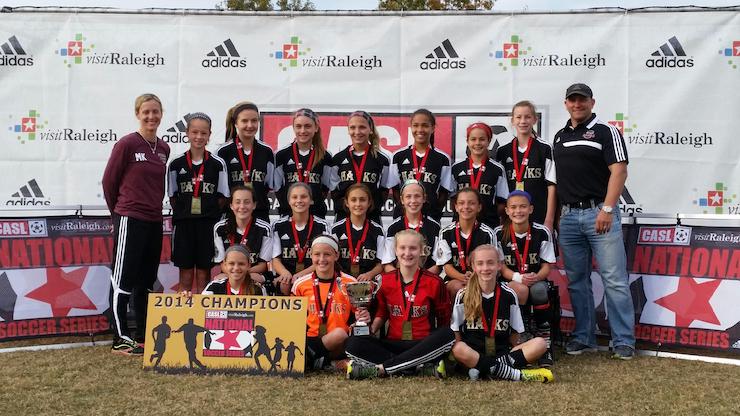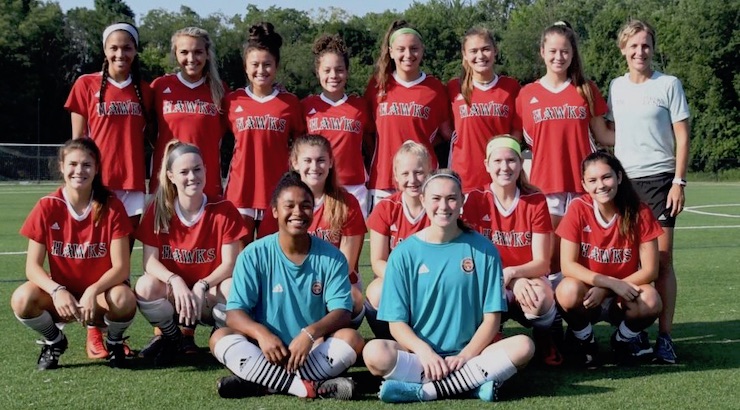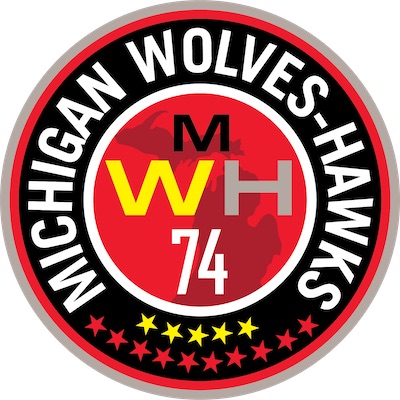TRAILBLAZER MICHELE KRZISNIK ON BEING THE STATE’S ONLY FEMALE DIRECTOR OF COACHING
Michigan Hawks’ Female Director of Coaching on Choosing ECNL, Developing Players and Being a Leader
Making history and doing it right: Michigan Hawks Soccer Club appoints former player and longtime coach Michele Krzisnik as Director of Coaching – only female DOC in the state. Krzisnik has helped develop three Michigan Gatorade Players of the Year, two U.S Women’s National Team players and has been named NSCAA National Coach of the Year for Youth Girls and MSYSA Youth Coach of the Year in 2014.
Youth Soccer News: The Michigan Hawks is a national youth soccer powerhouse with vision. Michele Krzisnik, a former captain of the University of Michigan’s women’s soccer team and a former Hawk player herself has now assumed the responsibilities of Director of Coaching.
A trailblazer, Krzisnik believes in being a role model for the next generation.
Related Article: MICHIGAN HAWKS BRING ON MICHELE KRZISNIK AS DIRECTOR OF COACHING
Here is Part 1 of our two-part SoccerToday interview with Trailblazer Michele Krzisnik
Diane Scavuzzo: You’re the only woman Director of Coaching in the state?
Michele Krzisnik: To be honest I didn’t know that I was the only female director of coaching in Michigan.
I know, throughout the country, there aren’t very many of us — I think the number of women in soccer is growing now, which is fantastic.
If I’m the only one in the state, I hope that changes, sooner rather than later. It just tells you that we’re probably not where we need to be.
We definitely need to empower more women to be able to be in leadership positions.
Diane Scavuzzo: How does soccer develop young girls into accomplished women?
Michele Krzisnik: Soccer empowers you, and that’s really important.
I was a quiet person growing up. I didn’t have much of my own voice. Soccer allowed me to be who I am today. In fact, my original reason for coaching was because someone had opened doors for me and I wanted to be able to provide opportunities for others.
I want to be able to empower girls to have more opportunities in their life.
Diane Scavuzzo: Do you believe that, in general, America is doing enough to create opportunities for young girls to be able to improve their skills?
Michele Krzisnik: That is a tough question for me.
I’m not of that mindset that you’re ever doing enough.
I believe if you’re not looking to always improve a process, or get better, then you’re probably not in the right place — you’re not doing what you should be. Even just in the club process, you have to continue to evolve, grow and learn.

In terms of the girl’s environment now, I think we’re trying although the landscape in girls’ youth soccer is contentious right now, as you know.
You have both sides — ECNL on one side, and the U.S. Soccer Development Academy (DA) on the other. Each with a belief that they are doing the right thing. It’s difficult because the clubs’ coaches are finding themselves right between those two entities, trying to decide what the best thing is.
I think everyone should choose their own pathway.
The Hawks were lucky enough that we were in both the DA and ECNL last year.
Diane Scavuzzo: Do the Hawks still compete in both?
Michele Krzisnik: No, we did both the Academy and ECNL pretty successfully. The problem is that these two entities really have different beliefs.
So we had to weigh all the pro’s and the con’s of each, and we ultimately chose the ECNL as our pathway because it better fit our core values, and our players’ needs — and that is really important to us.
Diane Scavuzzo: How did ECNL fit your core values better?
Michele Krzisnik: Personally, I believe that the players should get to choose if they want to play high school soccer.
I don’t want to tell someone what their path is. I can guide them, but I always want them to have the opportunity to choose what their pathway is, and ECNL allows that freedom.
And, when you’re training four days a week, even if you allow players to play other sports, the ability to do it is not really possible.
Diane Scavuzzo: There’s no time ….
Michele Krzisnik: Right, there’s no time, so if you are claiming that you want players to be able to choose their pathway, you have to provide for a little bit of leeway. The ECNL provides this.
Diane Scavuzzo: So the Hawks were in both the DA and ECNL last year, and now you’re just ECNL — the main deciding factor was the philosophical belief that it’s important that players have the ability to choose?
Michele Krzisnik: Absolutely. The biggest factor is the girls having a choice. Obviously, we’re fueled by our people, and the benefit of having two groups in different leagues was comparing experiences. The difference in the experience was very interesting.

Diane Scavuzzo: What were the differences?
Michele Krzisnik: I’m a strong believer in ECNL’s support of female players — ECNL has the marketing piece down, their branding is great, and I think it’s really important to give young girls a strong voice and their marketing to the girls is a little bit more social, more fun.
ECNL has found a way to remain extremely competitive, and offer that top-level of competition, yet include the fun — that is why the girls love to go to ECNL events.
ECNL has found a way to incorporate the inclusivity of girls supporting one another.
Diane Scavuzzo: How many of your young girls want to become professional players?
Michele Krzisnik: I have watched Chicago Red Stars’ Summer Green for years, she was one of my players. Although she’s playing soccer professionally in the NWSL, she doesn’t make enough money to live on her own. She’s being hosted and living in the attic — she doesn’t have her own house, her own place. Is playing professional soccer is a realistic goal for these girls? A talented player can do it for a little while, but they can’t live like that too long.
America is not a market where girls can play soccer professionally yet, at least not most of them.
Recently, we took 23 girls to Lyon, France with the Adidas group —and it was a fantastic trip. It was great to see the respect that Olympique Lyonnais has for its players — it is really an unbelievable environment. The money that they support their women with is different than what we do in America, and those players are making enough to live.
To have playing professionally as a goal is fine — I think many of these girls need to have it as a goal; whether they want to be on the National team or play professionally — but to have that as the main goal for most of the girls is unrealistic at this point. So for me, my ultimate goal for these girls is college.
Diane Scavuzzo: If you had a magic wand, what would you want to change in American soccer?
Michele Krzisnik: If I had a magic wand? That’s a difficult question. I’d create more resources — find a way for people to work together. Ultimately, the people who’ve been in the game for the past 15 or 20 years have an idea of what needs to happen, but I don’t know if we’re really working together in the best way to make it happen.
I don’t know if there’s enough trust, and I think like to see this change.
Diane Scavuzzo: What are your goals as Director of Coaching for the Hawks?
Michele Krzisnik: We want to develop players who are aware, conclusive, and efficient.
Confident players with a good attitude, who are fierce competitors.
I want players who are respectful, with leadership capabilities.
I’m very proud of the fact I’ve been able to lead in the club where I once played. I grew up in this community. I started playing with the Hawks when I was 11 years old and I’m grateful for the opportunity to be able to lead where I grew up as a kid, and where I started my coaching career.
I have worked with Doug Landefeld and Adil Salmoni for many years. They are two of the best coaches that I know, and they are two of the best men that I know who coach girls. They’re extremely supportive of me and they’ve always pushed me to do more, and take on a leadership role and they are great motivators.
If you’re around people who are motivating every day, it’s helpful.
Diane Scavuzzo: What do you think are those important traits for good leadership?
Michele Krzisnik: I think it’s all about the inclusive.
It really is about including people — and I think it’s about imparting knowledge. It’s about trying to create players who are confident and knowledgeable and feel good about themselves.
The best leaders I know allow people to grow, and help people grow, and contribute to that growth, and promote their growth.
Leadership is all about continuing to force evolution, change and the bettering of things.

Diane Scavuzzo: What advice would you give a young girl who wants to try out for your club, or wants to become the next national team star?
Michele Krzisnik: She should go after her dreams. She should put a plan in place. and find someone who believes in her to help her achieve her goals.
Just go for it. Because in the end, that’s what it takes.
And, I think sometimes it takes someone else to believe in you. For me, it took someone actually saying, “You are good at this.”
Diane Scavuzzo: What do you look for in a coach?
Michele Krzisnik: Someone who’s passionate, committed and knowledgeable, obviously. People who are good with kids, who understand kids, who are good at working with kids.
Diane Scavuzzo: Did you have a female coach as a role model?
Michele Krzisnik: I was lucky to have female coaches growing up in a time where there weren’t a lot of female coaches. I had a female high school soccer coach and I had a female club coach. I also had a very, very strong mother, and I had female volleyball coaches.
I was lucky to have played for females who really shaped me and taught me how to make my way in that piece.
Diane Scavuzzo: How important do you think it is that a young girl has a female coach?
Michele Krzisnik: I think it’s important. There are differences. I can probably say things and do things that men probably aren’t as comfortable doing … I have avenues to have conversations with the girls that probably aren’t necessarily as easy for a male coach.
I think there’s value in both male and female coaches, and it’s great for girls to have both. Each coach is different, not necessarily because of being a male or female.
As Michele Krzisnik says on the Hawks’ website, “We hope to empower girls and young women to want more, expect more and achieve more in soccer and life. From a soccer perspective, we believe in setting a high standard for our players. We want our girls to continue to push to reach and raise that bar on a daily basis.”
Noble goals, worthy of pursuit.
Michigan Hawks’ Female Director of Coaching on Choosing ECNL, Developing Players and Being a Leader
Making history and doing it right: Michigan Hawks Soccer Club appoints former player and longtime coach Michele Krzisnik as Director of Coaching – only female DOC in the state. Krzisnik has helped develop three Michigan Gatorade Players of the Year, two U.S Women’s National Team players and has been named NSCAA National Coach of the Year for Youth Girls and MSYSA Youth Coach of the Year in 2014.
Youth Soccer News: The Michigan Hawks is a national youth soccer powerhouse with vision. Michele Krzisnik, a former captain of the University of Michigan’s women’s soccer team and a former Hawk player herself has now assumed the responsibilities of Director of Coaching.
A trailblazer, Krzisnik believes in being a role model for the next generation.
Related Article: MICHIGAN HAWKS BRING ON MICHELE KRZISNIK AS DIRECTOR OF COACHING
Here is Part 1 of our two-part SoccerToday interview with Trailblazer Michele Krzisnik
Diane Scavuzzo: You’re the only woman Director of Coaching in the state?
Michele Krzisnik: To be honest I didn’t know that I was the only female director of coaching in Michigan.
I know, throughout the country, there aren’t very many of us — I think the number of women in soccer is growing now, which is fantastic.
If I’m the only one in the state, I hope that changes, sooner rather than later. It just tells you that we’re probably not where we need to be.
We definitely need to empower more women to be able to be in leadership positions.
Diane Scavuzzo: How does soccer develop young girls into accomplished women?
Michele Krzisnik: Soccer empowers you, and that’s really important.
I was a quiet person growing up. I didn’t have much of my own voice. Soccer allowed me to be who I am today. In fact, my original reason for coaching was because someone had opened doors for me and I wanted to be able to provide opportunities for others.
I want to be able to empower girls to have more opportunities in their life.
Diane Scavuzzo: Do you believe that, in general, America is doing enough to create opportunities for young girls to be able to improve their skills?
Michele Krzisnik: That is a tough question for me.
I’m not of that mindset that you’re ever doing enough.
I believe if you’re not looking to always improve a process, or get better, then you’re probably not in the right place — you’re not doing what you should be. Even just in the club process, you have to continue to evolve, grow and learn.

In terms of the girl’s environment now, I think we’re trying although the landscape in girls’ youth soccer is contentious right now, as you know.
You have both sides — ECNL on one side, and the U.S. Soccer Development Academy (DA) on the other. Each with a belief that they are doing the right thing. It’s difficult because the clubs’ coaches are finding themselves right between those two entities, trying to decide what the best thing is.
I think everyone should choose their own pathway.
The Hawks were lucky enough that we were in both the DA and ECNL last year.
Diane Scavuzzo: Do the Hawks still compete in both?
Michele Krzisnik: No, we did both the Academy and ECNL pretty successfully. The problem is that these two entities really have different beliefs.
So we had to weigh all the pro’s and the con’s of each, and we ultimately chose the ECNL as our pathway because it better fit our core values, and our players’ needs — and that is really important to us.
Diane Scavuzzo: How did ECNL fit your core values better?
Michele Krzisnik: Personally, I believe that the players should get to choose if they want to play high school soccer.
I don’t want to tell someone what their path is. I can guide them, but I always want them to have the opportunity to choose what their pathway is, and ECNL allows that freedom.
And, when you’re training four days a week, even if you allow players to play other sports, the ability to do it is not really possible.
Diane Scavuzzo: There’s no time ….
Michele Krzisnik: Right, there’s no time, so if you are claiming that you want players to be able to choose their pathway, you have to provide for a little bit of leeway. The ECNL provides this.
Diane Scavuzzo: So the Hawks were in both the DA and ECNL last year, and now you’re just ECNL — the main deciding factor was the philosophical belief that it’s important that players have the ability to choose?
Michele Krzisnik: Absolutely. The biggest factor is the girls having a choice. Obviously, we’re fueled by our people, and the benefit of having two groups in different leagues was comparing experiences. The difference in the experience was very interesting.

Diane Scavuzzo: What were the differences?
Michele Krzisnik: I’m a strong believer in ECNL’s support of female players — ECNL has the marketing piece down, their branding is great, and I think it’s really important to give young girls a strong voice and their marketing to the girls is a little bit more social, more fun.
ECNL has found a way to remain extremely competitive, and offer that top-level of competition, yet include the fun — that is why the girls love to go to ECNL events.
ECNL has found a way to incorporate the inclusivity of girls supporting one another.
Diane Scavuzzo: How many of your young girls want to become professional players?
Michele Krzisnik: I have watched Chicago Red Stars’ Summer Green for years, she was one of my players. Although she’s playing soccer professionally in the NWSL, she doesn’t make enough money to live on her own. She’s being hosted and living in the attic — she doesn’t have her own house, her own place. Is playing professional soccer is a realistic goal for these girls? A talented player can do it for a little while, but they can’t live like that too long.
America is not a market where girls can play soccer professionally yet, at least not most of them.
Recently, we took 23 girls to Lyon, France with the Adidas group —and it was a fantastic trip. It was great to see the respect that Olympique Lyonnais has for its players — it is really an unbelievable environment. The money that they support their women with is different than what we do in America, and those players are making enough to live.
To have playing professionally as a goal is fine — I think many of these girls need to have it as a goal; whether they want to be on the National team or play professionally — but to have that as the main goal for most of the girls is unrealistic at this point. So for me, my ultimate goal for these girls is college.
Diane Scavuzzo: If you had a magic wand, what would you want to change in American soccer?
Michele Krzisnik: If I had a magic wand? That’s a difficult question. I’d create more resources — find a way for people to work together. Ultimately, the people who’ve been in the game for the past 15 or 20 years have an idea of what needs to happen, but I don’t know if we’re really working together in the best way to make it happen.
I don’t know if there’s enough trust, and I think like to see this change.
Diane Scavuzzo: What are your goals as Director of Coaching for the Hawks?
Michele Krzisnik: We want to develop players who are aware, conclusive, and efficient.
Confident players with a good attitude, who are fierce competitors.
I want players who are respectful, with leadership capabilities.
I’m very proud of the fact I’ve been able to lead in the club where I once played. I grew up in this community. I started playing with the Hawks when I was 11 years old and I’m grateful for the opportunity to be able to lead where I grew up as a kid, and where I started my coaching career.
I have worked with Doug Landefeld and Adil Salmoni for many years. They are two of the best coaches that I know, and they are two of the best men that I know who coach girls. They’re extremely supportive of me and they’ve always pushed me to do more, and take on a leadership role and they are great motivators.
If you’re around people who are motivating every day, it’s helpful.
Diane Scavuzzo: What do you think are those important traits for good leadership?
Michele Krzisnik: I think it’s all about the inclusive.
It really is about including people — and I think it’s about imparting knowledge. It’s about trying to create players who are confident and knowledgeable and feel good about themselves.
The best leaders I know allow people to grow, and help people grow, and contribute to that growth, and promote their growth.
Leadership is all about continuing to force evolution, change and the bettering of things.

Diane Scavuzzo: What advice would you give a young girl who wants to try out for your club, or wants to become the next national team star?
Michele Krzisnik: She should go after her dreams. She should put a plan in place. and find someone who believes in her to help her achieve her goals.
Just go for it. Because in the end, that’s what it takes.
And, I think sometimes it takes someone else to believe in you. For me, it took someone actually saying, “You are good at this.”
Diane Scavuzzo: What do you look for in a coach?
Michele Krzisnik: Someone who’s passionate, committed and knowledgeable, obviously. People who are good with kids, who understand kids, who are good at working with kids.
Diane Scavuzzo: Did you have a female coach as a role model?
Michele Krzisnik: I was lucky to have female coaches growing up in a time where there weren’t a lot of female coaches. I had a female high school soccer coach and I had a female club coach. I also had a very, very strong mother, and I had female volleyball coaches.
I was lucky to have played for females who really shaped me and taught me how to make my way in that piece.
Diane Scavuzzo: How important do you think it is that a young girl has a female coach?
Michele Krzisnik: I think it’s important. There are differences. I can probably say things and do things that men probably aren’t as comfortable doing … I have avenues to have conversations with the girls that probably aren’t necessarily as easy for a male coach.
I think there’s value in both male and female coaches, and it’s great for girls to have both. Each coach is different, not necessarily because of being a male or female.
As Michele Krzisnik says on the Hawks’ website, “We hope to empower girls and young women to want more, expect more and achieve more in soccer and life. From a soccer perspective, we believe in setting a high standard for our players. We want our girls to continue to push to reach and raise that bar on a daily basis.”
Noble goals, worthy of pursuit.

